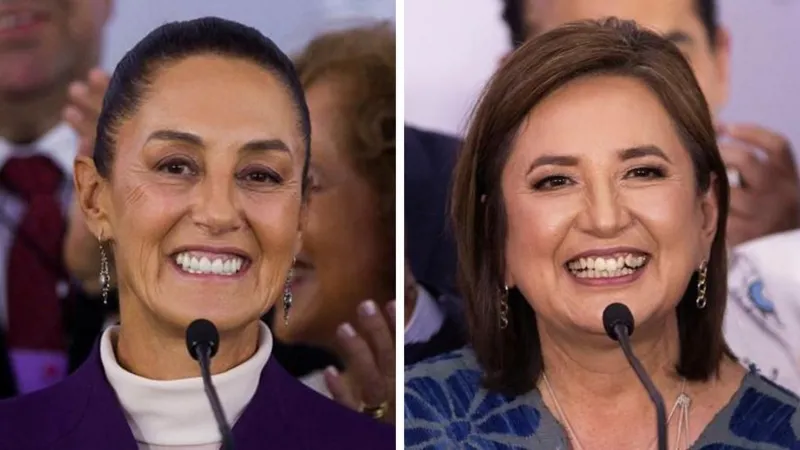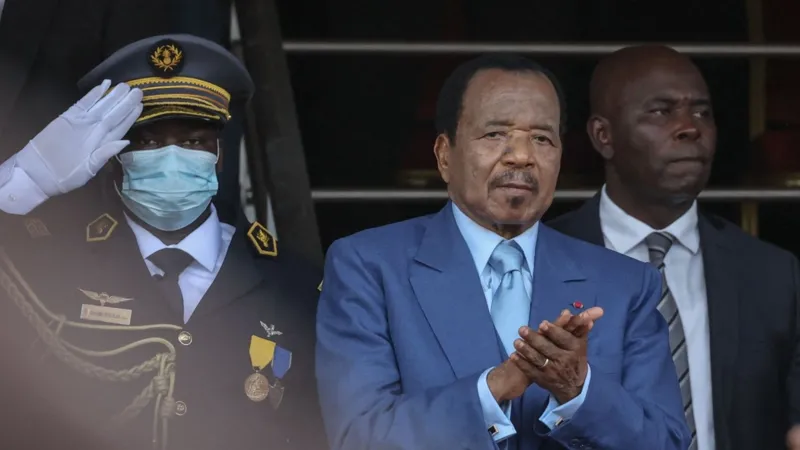Migrants and drugs - why Mexico's election matters to the US
Mexico's upcoming presidential election has already attracted a lot of media attention due to the fact that it is expected to deliver the country’s first female head of state.

Opinion polls have given the frontrunner, Claudia Sheinbaum, and her main rival, Xóchitl Gálvez, such a large lead over their male rivals, that a female president looks like a foregone conclusion.
But whoever wins this coming Sunday will have to deal with the sensitive relationship with the United States, which is not only Mexico’s northern neighbour but also its top commercial partner.
How to handle the Mexican drug cartels – largely blamed by US authorities for the deadly epidemic of fentanyl overdoses and deaths in the US – is not the only daunting issue for the Mexican presidential candidates.
The winner will also have to deal with the record flows through Mexico of US-bound foreign migrants that are a burning topic in the US’ own 2024 electoral race.
The scenario is complicated by the possibility of the return to the US presidency of Donald Trump, whose strident positions on migrants and drugs have raised eyebrows south of the border.
Mr Trump has vowed to carry out the "largest deportation operation" in US history to remove undocumented migrants already in the country if he returns to the White House.
Some Mexican media commentators are calling a possible second Trump presidency "the elephant in the room" for Mexico's presidential hopefuls.
Both Ms Sheinbaum and Ms Gálvez have emphasised the importance of Mexico's relationship with the US, and they have both pledged to broadly pursue good bilateral cooperation.
Ms Sheinbaum, who is running for the governing Morena party, has vowed to continue with "pride" the foreign policy of her mentor, outgoing President Andrés Manuel López Obrador.
Relations between the US and Mexico during the six years Mr López Obrador has been in power have not been without tension, with disagreements flaring over US counter-narcotics operations inside Mexico, as well as over measures taken by the US on its border to try to control migrants.
Opposition contender Xóchitl Gálvez has called the outgoing government's foreign policy a "disaster".
But like Ms Sheinbaum, she has also taken a strongly pro-migrant stance, particularly with respect to Mexican migrants in the US.
Aware that nationalist pride plays strongly in Mexico, both candidates made a point in a recent presidential debate of stressing that their governments would not let themselves be cowed or bullied by the US, especially over migration.
Ms Sheinbaum declared that there would be "no more submission in foreign policy", saying that centre-right predecessors of Mr López Obrador had allowed themselves to be "humiliated" by the US.
"Coordination yes, subordination no," she said, summarising her vision of relations with the US back in March.
“We will always tell them [the US] it’s better to build bridges rather than walls," she added a few weeks later.
Opposition contender Xóchitl Gálvez has also pledged a “frank, direct and clear” relationship with the US, which she has recognised as "our most important market".
In one of the presidential debates she reproached the current government for having "caved in" to then President Donald Trump by agreeing to keep US-bound migrants in Mexico after the right-wing US leader threatened to slap tariff penalties on Mexican goods.
She has also said that, as president, she would not "bow down without putting up a fight".
However, she added that "authoritarian governments like Venezuela, Russia, Cuba, [and] Nicaragua won't be coming to parade here", indicating that her government would be less friendly to such overtly anti-US leaders than the current Mexican government and its candidate, Claudia Sheinbaum.
The two rivals have also sparred over immigration and security policies, key areas in which Mexico has periodically faced US complaints of not providing enough cooperation.
Ms Sheinbaum has repeated President López Obrador's calls for the US to invest more in Mexico and Central America to help reduce the pressure for northwards migration. The "United States can do more," she has argued.
Ms Gálvez too has listed "protection of migrants" among her priorities, including a call for the "regularisation [of the status] of our compatriots who live in the United States".
In their public statements at least, both of the leading Mexican presidential contenders have promised cooperation with the US against drug-trafficking.
While critics in Mexico and the US have accused President López Obrador of putting curbs on counter-narcotics cooperation, especially on the activities in Mexico of the US Drug Enforcement Administration (DEA), Ms Gálvez has said she would not limit exchange of information with the US.
Across the border in the US, Republican Party candidate Donald Trump has made it clear that he would double down on plans to secure the US border with barriers and troops, even reportedly suggesting he might send "kill teams" into Mexico to eliminate cartel leaders.
When asked about a possible Trump victory, both Ms Sheinbaum and Ms Gálvez said they could handle and maintain good ties.
“President López Obrador in the end had a good relationship with Trump and I don’t see why we wouldn’t be able to have it as well,” Ms Sheinbaum said recently.
Ms Gálvez has also said she was “not afraid of Trump nor of Biden”, and would work with either.
-bbc







